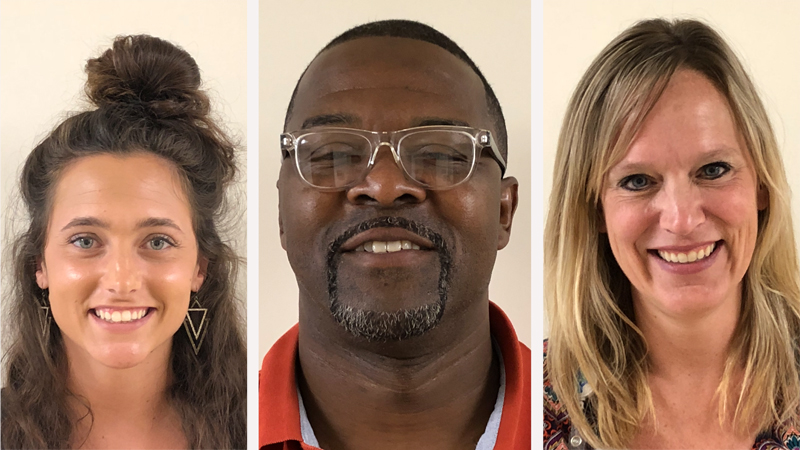Peers guide addicts toward recovery

By JORDYN GRZELEWSKI
jgrzelewski@vindy.com
YOUNGSTOWN
Early in his recovery from addiction, Joseph Mead found hope in the stories of people who were further down the path of recovery.
Now, 81⁄2 years sober, he is providing that help to others just starting down that path.
Mead is among several peer-
recovery support workers who recently began working in the community thanks to federal funding and matching funds from the Mercy Health Foundation.
The program that began earlier this year intends to provide support to individuals with substance-use disorders from someone who understands what they are experiencing.
“What’s always helped me is somebody else who comes in and is able to speak that language,” said Mead. “Addicts and alcoholics tend to live isolated, they tend to live in fear, and that keeps them trapped.”
Program leaders hope peer support will help break down some of those barriers to recovery.
The program came about after Mercy Health and others in the community noticed a gap in care for patients struggling with addiction, said Kathy Komara, director of operations for Mercy Health’s Behavioral Health Institute.
“Patients were leaving without getting care because there wasn’t anyone to take the time to familiarize themselves and get the patient comfortable,” she said.
After former President Barack Obama signed the 21st Century Cures Act into law in 2016, $26 million was made available to Ohio to combat the opioid epidemic.
The Mahoning County Mental Health and Recovery Board applied for and received a grant from the Ohio Department of Mental Health & Addiction Services to start a peer recovery program.
The board received $140,000 in grant funding last year and $146,000 this year. The Mercy Health Foundation matched 100 percent of that last year and is committed to providing a comparable amount this year.
“It’s a unique opportunity that we have people who have actually experienced what it’s like to go through detox, and to know there is a light at the end of the tunnel,” said Duane Piccirilli, Mahoning County Mental Health and Recovery Board executive director. “We think having these people with life experiences there has really helped.”
A peer-support worker is someone with lived the experience of recovery and provides support to others experiencing similar challenges. Numerous studies have identified positive outcomes from peer support, according to a 2017 Substance Abuse and Mental Health Services Administration report. The service is intended to be part of a treatment plan that includes other components.
The SAMHSA report cites research indicating that peer support for people with substance-use disorders increases treatment retention, increases satisfaction with the treatment experience, improves access to social supports and provides greater housing stability, decreases criminal-justice involvement, reduces relapse rates and decreases emergency-service utilization, among other positive outcomes.
“While the body of research is still growing, there is mounting evidence that people receiving peer-
recovery coaching show reductions in substance use, improvements on a range of recovery outcomes, or both,” the report states.
The Mahoning County program includes a navigator who coordinates the program and seven peer-
recovery support workers, four of whom are based at Mercy Health’s hospitals in Mahoning and Trumbull counties. The others are based at local treatment centers. The foundation also has partners in Trumbull County that help fund peer-recovery supporters at facilities there.
At Mercy Health, every patient now goes through a screening process. Depending on how they answer the screening questions, the peer-recovery supports are notified and meet with the patient, if the patient is willing.
Alan Reid Jr., one of the peer supports, said he can relate to patients in a way clinical staff may not be able to.
“I understand what the addict or the alcoholic is going through,” said Reid, who has been in recovery for 13 years. “It’s a difference when myself or co-workers talk to patients. They can relate to us because we’ve been in their shoes.”
Reid said he begins those conversations by trying to make the patient comfortable, letting them know right away that he’s in recovery.
Each patient is different, and the goal might not always be to get them into a treatment program right away. Those involved in the program say their job is to provide whatever support participants need, whether that’s food, clothing, advice, or just a phone call to let them know someone cares.
“Not that we’re the face of recovery, but we’re the face of the possibilities of recovery if they choose to engage in it,” Reid said.
“It’s really just planting the seed and educating them on how good recovery can be,” said Paige Eckman, the Mercy Health navigator who coordinates the program.
The program also accepts referrals from outside the hospital. For more information, contact Eckman at 330-314-7033.
 43
43
